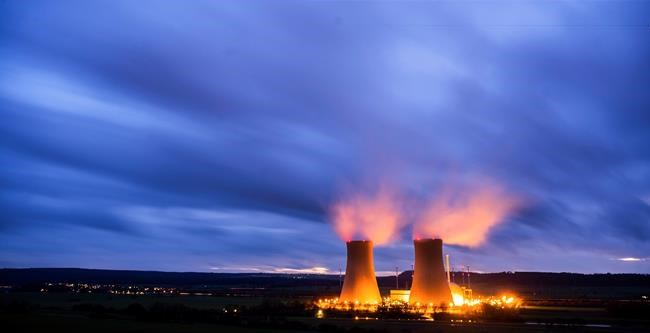Germany calls nuclear power ‘dangerous,’ rejects EU plan
Advertisement
Read this article for free:
or
Already have an account? Log in here »
To continue reading, please subscribe:
Monthly Digital Subscription
$1 per week for 24 weeks*
- Enjoy unlimited reading on winnipegfreepress.com
- Read the E-Edition, our digital replica newspaper
- Access News Break, our award-winning app
- Play interactive puzzles
*Billed as $4.00 plus GST every four weeks. After 24 weeks, price increases to the regular rate of $19.00 plus GST every four weeks. Offer available to new and qualified returning subscribers only. Cancel any time.
Monthly Digital Subscription
$4.75/week*
- Enjoy unlimited reading on winnipegfreepress.com
- Read the E-Edition, our digital replica newspaper
- Access News Break, our award-winning app
- Play interactive puzzles
*Billed as $19 plus GST every four weeks. Cancel any time.
To continue reading, please subscribe:
Add Free Press access to your Brandon Sun subscription for only an additional
$1 for the first 4 weeks*
*Your next subscription payment will increase by $1.00 and you will be charged $16.99 plus GST for four weeks. After four weeks, your payment will increase to $23.99 plus GST every four weeks.
Read unlimited articles for free today:
or
Already have an account? Log in here »
Hey there, time traveller!
This article was published 03/01/2022 (1374 days ago), so information in it may no longer be current.
BERLIN (AP) — The German government said Monday that it considers nuclear energy dangerous and objects to European Union proposals that would let the technology remain part of the bloc’s plans for a climate-friendly future.
Germany is on course to switch off its remaining three nuclear power plants at the end of this year and phase out coal by 2030, whereas its neighbor France aims to modernize existing reactors and build new ones to meet its future energy needs. Berlin plans to rely heavily on natural gas until it can be replaced by non-polluting sources for energy.
The opposing paths taken by two of the EU’s biggest economies have resulted in an awkward situation for the bloc’s executive Commission. A draft EU plan seen by The Associated Press concludes that both nuclear energy and natural gas can under certain conditions be considered sustainable for investment purposes.

“We consider nuclear technology to be dangerous,” government spokesman Steffen Hebestreit told reporters in Berlin, noting that the question of what to do with radioactive waste that will last for thousands of generations remains unresolved.
Hebestreit added that Germany “expressly rejects” the EU’s assessment of atomic energy and has repeatedly stated this position toward the commission.
Germany is now considering its next steps on the issue, he said.
Environmentalists have criticized Germany’s emphasis on natural gas, which is less polluting than coal but still produces carbon dioxide — the main greenhouse gas — when it is burned.
Hebestreit said the German government’s goal is to use natural gas only as a “bridge technology” and replace it with non-polluting alternatives such as hydrogen produced with renewable energy by 2045, the deadline the country has set to become climate neutral.
He declined to say whether Chancellor Olaf Scholz backs Economy and Climate Minister Robert Habeck’s view that the EU Commission’s proposals were a form of “greenwashing.”

